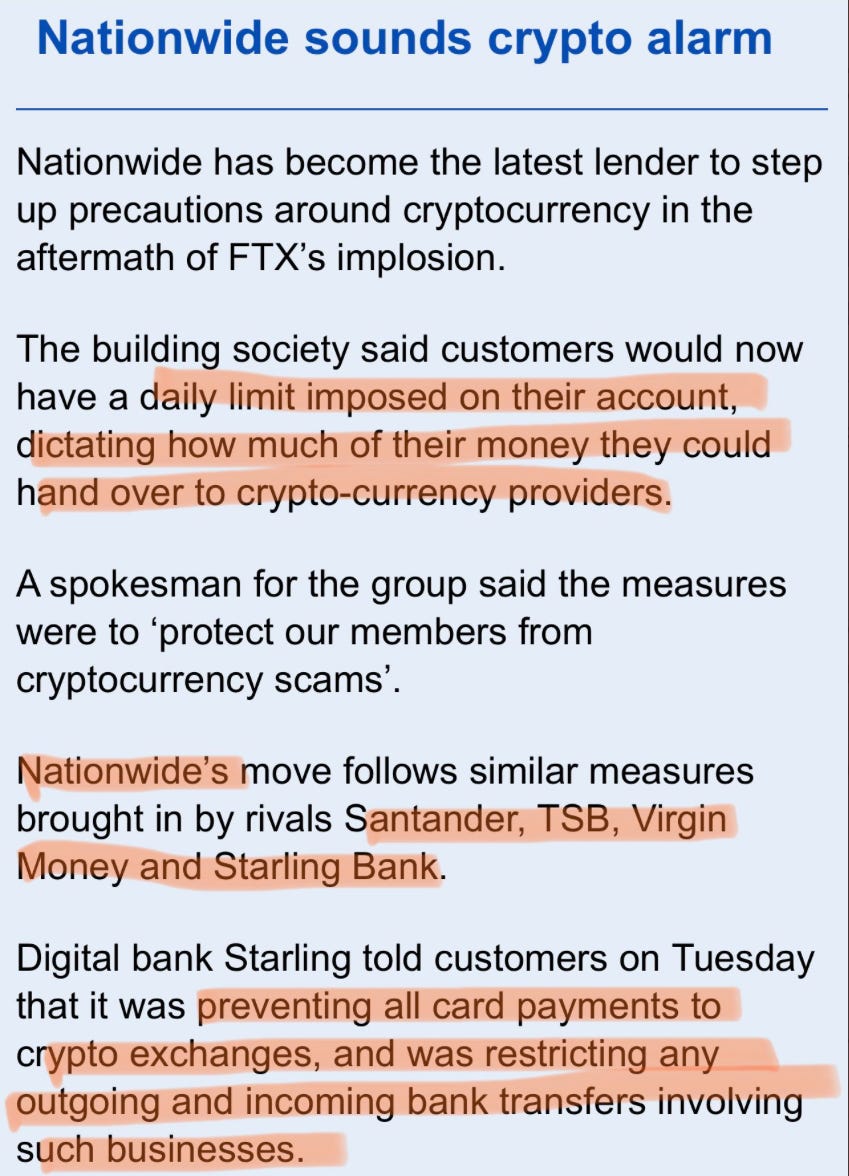CASHLESS SOCIETY: Controlled spending on meat, flights abroad, alcohol – and NO lifeline for victims of abuse
The Government isn't building your digital prison - you are
By Adam Edwards
GOVERNMENTS are not hiding their desire to implement Central Bank Digital Currencies (CBDCs) in place of cash. Neither are they hiding their push for digital IDs and vaccine passports.
From Britain to Nigeria, research is well under way into developing CBDCs, which according to the Bank of England, could also be “programmable”, allowing government not only to control what people are allowed to spend their money on, but how much – if any – they are allowed to save.
With CBDCs, governments will be able to see what you are earning, when you are earning it and how you are earning it. They will then be able to track and control what you spend it on, preventing you from spending it on what they deem ‘harmful’, such as meat, flights abroad, alcohol or fertiliser.
It is also possible that governments can put in eligibility criteria for citizens to be able to earn and spend.
For example, they could insist that only the jabbed are allowed to earn and spend money.
We have already heard Chancellor Jeremy Hunt say that we need to change our habits – controlling our ability to spend is a very efficient way to force such a change.
CBDCs can also have expiry dates, much like gift cards, to prevent people accruing generational wealth. In the event of an economic crisis (like the one we’re in now) people can be forced to spend their own money within a certain timeframe before it is ‘disappeared’.
In order for CBDCs to be used, each citizen will need to have a digital ID too, which will further increase government’s control over its electorate.
The Nigerian Government is already trialling CBDCs. Britain, meanwhile, is still very much in the research and development phase. And yet it is we Brits, not the Nigerians, who will likely find our lives controlled by government-issued CBDCs sooner rather than later.
The reason? Nigerians have roundly rejected CBDCs. Less than 0.5 per cent of the country have ever tried the eNaira, despite generous government incentives to encourage its use. Decades of corruption have made Nigerians suspicious of government overreach and, sensing a rat, Nigerians have opted to stick with cash. Full story here.
In Britain, on the other hand, millions of people have given up on cash altogether, while tens of millions more have been conditioned into using contactless payments for almost every transaction since the lockdowns.
With less demand for cash, businesses are increasingly turning card-only, creating a snowball effect that risks forcing – and embarrassing – more and more people into ditching cash payments.
This is very problematic: more than two million Britons have no access to debit or credit cards, according to the British Retail Consortium. A further 10 to 12 million heavily rely on cash to budget. By ditching cash, they are inadvertently locking these people out of society.
And it is not just a few million older people who are finding their money is no longer welcome. Cashless businesses also discriminate against millions of children and asylum seekers, who are also far less likely to have cards, as well as people with autism, sight loss and dexterity issues many of whom find cash easier to use than card or phone payments.
The dash away from cash also risks making life unbearable for the millions upon millions of men, women and children in coercive relationships, for whom cash is not only a lifeline but their only means to avoid being controlled.
See, it is not just governments and banks who can track and control you in a cashless world. Battered wives or husbands can be tracked 24/7. Even worse, without cash, they can be stopped from ever being able to flee their abuser (most victims have to horde cash in order to make an escape, as they cannot risk being found by later withdrawing cash).
In a cashless world, closeted homosexuals could be outed – and potentially bundled off to Asia for arranged marriages – by a relative snooping on their credit card bill. Their sisters, meanwhile, could face a similar fate for buying something as innocuous as makeup or contraceptives.
The point is not the logistics of going cashless, it is that most people have sleep-walked into cashlessness. Even our MPs have not realised there are any downfalls to ditching cash, as our investigation in conjunction with the consumer advice website MoneyMagpie found. Full story here.
When confronted with the list of people that are discriminated against by cashless businesses, for example, both Labour and Conservative MPs alike expressed shock and spoke of their intention to either write to ministers, lodge amendments to financial bills, or raise awareness among their colleagues on the matter.
This is why it is imperative for sceptics to not only use cash wherever humanly possible, but to boycott cashless businesses (having first politely pointed out why you are doing so). Quite a number of businesses, particularly small, local ones, change their policy pretty quickly if enough potential customers let them know that they will not come back until they accept cash.
For a list of big businesses to avoid or support, see MoneyMagpie for more details: here.
To find the contact details for your local MP, click here








I often mention to my friends in the pub that we'll miss cash when its gone, and yes, have used the phrase "we're building a digital prison for ourselves". I get completely blank looks as they pay for their round with ApplePay.
Find yourself a hacker friend, like conspiracy friends, they’ll keep you alive in the coming future. Resist centralization at all costs.